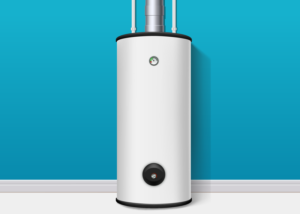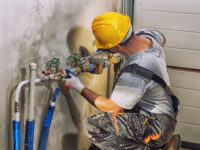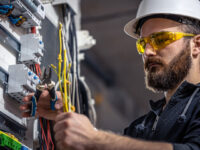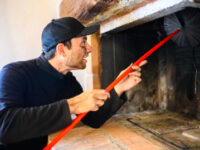How to Select Water Heaters
Water Heaters Denver CO are vital appliances that keep your showers, washing machines, and dishwashers running smoothly. When it comes to selecting a new unit, it pays to talk with a professional to find out your household’s needs and energy usage.
Tank-type heaters use electricity, natural gas, liquid propane, or oil to heat cold water. They have large insulated tanks that keep water hot until it’s needed.
Water heaters are designed to heat incoming cold water so that appliances like washing machines, clothes dryers, and showers can deliver warm or hot water for our domestic needs. They are usually located in a utility room or behind the scenes, out of sight but vital to our daily activities.
There are several different types of water heaters to choose from, each designed for specific household usage and energy efficiency. Here are some of the most common types:
The conventional tank-type heater is one of the most popular models on the market. It features an insulated tank that holds 20 to 80 gallons of water and is powered by natural gas, propane, fuel oil or electricity. It has a thermostat that records the temperature of the water inside the tank, and when readings fall below a pre-set temperature, the unit kicks on to heat it back up. It is also equipped with a pressure relief valve to prevent excessive build-up of pressure in the tank.
Another popular choice is a point-of-use water heater that only heats the water as it passes through it. These smaller units are installed directly at fixtures, such as a washing machine or shower, and they are available in both electric and gas-powered versions. They are generally cheaper than larger tanks, but they can run out of hot water quickly and use more energy than other types of water heaters.
Whirlpool is perhaps the best-known name in home appliances, and they also make water heaters that come in a variety of sizes and options. Their ENERGY STAR qualified tank-less water heaters feature advanced technology that makes them among the most efficient on the market, and they are available in both gas and electric models.
Navien is a young company that specializes in making tankless water heaters, and they have made it their mission to produce units with exceptional energy efficiency levels. They are available in both gas and electric models, and their smallest heater is just 6 gallons, which can be perfect for small households. They also have a high level of quality control because they only sell their products to authorized dealers and wholesalers, which helps them keep a closer eye on product quality.
Installation
When it comes to installing water heaters, you need to be able to work with plumbing and electrical systems. The skills required are similar to those needed for home repairs and other DIY projects like refinishing furniture or planting a garden.
Before you can start the job, shut off the power and gas to your old water heater and drain the tank, if necessary. Then remove the vent pipe from the hood, and disconnect the hot and cold water lines using tubing cutters. You’ll also need to unscrew the drain valve from the bottom of the water heater and solder a new one. If you’re removing a gas water heater, call your local waste management service for disposal instructions.
Next, set the new water heater on top of cinder blocks or concrete blocks. It should be at least 6 inches from any wall to allow for proper ventilation. A heavy duty, insulated, drain pan should be installed underneath the water heater to prevent damage from flooding or leaking. It should be secured with a non-corrosive metal strap to keep it in place. If the heater is located in an area prone to earthquakes, it’s a good idea to brace the unit with steel straps or wood blocking strips.
For electric water heaters, it’s a good idea for the electrician to install a GFCI (ground fault circuit interrupter) at the location of the new heater in accordance with local codes. It’s also important to verify that the home’s voltage, wiring size and circuit breaker are compatible with the water heater. Read the manufacturer’s printed installation instructions and follow all safety warnings.
For gas water heaters, the plumber will need to make the necessary gas connections. Most homes have a 240-volt connection already run to the water heater area, but if not, it will cost more to bring in municipal gas from the street. The plumber will also need to install a temperature and pressure relief valve and a copper discharge line, if applicable. It’s a good idea to test the gas line with soapy water before turning on the water.
Energy Efficiency
When you buy a new water heater, energy efficiency is a major consideration. Not only will you save money on your utility bills, but you’ll also help reduce the amount of greenhouse gases released into the environment. You may want to consider a water heater that uses alternative fuels like solar, propane, or natural gas to reduce environmental impact even more.
A standard tank water heater is constantly working to keep a tank of hot water at its peak capacity 24/7. This requires a lot of excess energy, and expelled heat is wasted when the household is asleep or not using hot water at all. By installing a volt timer and turning off the heater at night, you can cut your energy consumption substantially.
Another option is to install a small-diameter piping system that runs the hot water from the heater to the end-uses. This reduces piping heat loss and wait times for hot water at the taps. In addition, it can cut installation costs by avoiding the need for a large copper piping run and multiple water heater connections.
An electric heat pump water heater uses one-third to one-half as much electricity as a traditional resistance tank water heater, saving you a significant amount of energy. Its only drawback is that it takes longer to get the hot water flowing, so it may not be a good choice for households that have heavy demand.
A high-efficiency gas tank water heater funnels heated exhaust from the flue gas into the water, reducing energy usage and waste. This is an ideal choice if you use natural gas as your primary heating source in the house.
If you live in a climate that receives abundant sunshine, a solar water heater can provide substantial savings on your utility bills. However, you must have access to reliable backup power sources in case of cloudy days.
Maintenance
Water heaters are one of those appliances that aren’t often thought about until they start malfunctioning or leaking. Then you realize how much you rely on hot water for everything from cleaning to sanitizing and personal hygiene.
Water Heaters need routine maintenance to extend their lifespan and function properly. Many established plumbing companies offer water heater maintenance plans for customers that include annual inspections and preventive repair services. These plans can help to catch small problems before they become major repairs or replace the appliance entirely.
A major reason to maintain a water heater is to keep it free of sediment and rock buildup that corrodes the interior lining. Sediment and rock are common problems for homes with hard water, such as those in Northern Illinois cities like Algonquin or St. Charles. Eventually this sediment can cause thousands of dollars worth of damage to the tank, plumbing and pipes. It also makes the water heater less efficient and can reduce its lifespan by a significant amount.
Draining and flushing a water heater every 6-12 months keeps this sediment from building up and prevents the onset of rust and corrosion. Other maintenance tasks to perform regularly include testing the anode rod and temperature release valve on gas and electric water heaters, annually. The anode rod acts as a sacrificial metal that attracts corrosive minerals to it rather than the tank. If the anode rod isn’t able to do this any longer, it needs replacing. The temperature release valve allows the pressure inside of the water heater to be released if it gets too high. If this valve isn’t working properly or is clogged with sediment, the water heater could explode.
Whenever doing maintenance on a water heater, always turn off the water supply valve and power for safety purposes. Also, it’s a good idea to keep flammable materials and cleaning rags away from the area. Always follow manufacturer instructions when doing any type of maintenance on a water heater.






